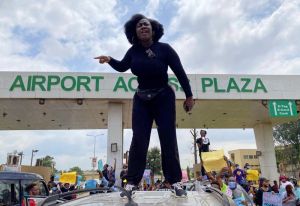Police brutality doesn’t just take place in America. It’s a worldwide issue. Currently in Nigeria, citizens are protesting police brutality in their own country.
After a disturbing video surfaced online on Oct. 4, protests started happening. “The footage shows officers dragging two men from a hotel, according to the Guardian, and shooting one of them outside,” Danielle Paquette, a reporter for the Washington Post, wrote.
Following the video, protests erupted in Nigeria’s major cities, with many people posting on Twitter and Instagram, using the hashtag #ENDSARS. SARS is a Nigerian Special Anti-Robbery Squad that has been accused of frequent use of brutality.
Attention moved toward the movement when one night during peaceful protests, Nigerian soldiers opened fire on the crowd.
Lagos State governor said that one person died last week from the shooting but characterized it as an isolated incident.
“An on-the-ground investigation by Amnesty International has confirmed that the Nigerian army and police killed at least 12 peaceful protesters yesterday at two locations in Lagos,” Amnesty International on Oct. 21st said.

#EndSARS came about in 2017 as Nigerian activists wanted to abolish the federal police unit called the Special Anti-Robbery Squad. Amnesty International has recorded 82 cases of SARS abuses over the past three years. Ranging from beatings, hangings, mock executions, sexual assault and waterboarding.
After protests and growing pressure internationally the Nigeria Police Force announced on Oct.11 that it had dissolved SARS and fired at least two officers in response to the outcry of the citizens. Demonstrators rejected the force’s plan to deploy members of the police unit in other jobs., the government has promised four times in the last four years for police reform. “The government vowed to work with human rights groups on a new model and investigate atrocities of the past, telling people to come forward if they had ever endured hostilities at the hands of a Nigerian officer,” Paquette wrote in the Washington Post.
“More countries should address police brutality and take action to stop that because people need to understand that police brutality happens across that country and that police should be held accountable for their actions,” Geralyn Brown, sophomore business management major, said.
“For me, SARS must be disbanded because the goal of SARS was to bring about fear of the police and to ensure violence against Black African people, but to also maintain a hierarchy of a false narrative that citizens in Africa, which is a continent, not a country, are viewed as less than, inferior, and that their lives don’t matter. SARS is not about stopping robberies it is about maintaining a level of domination and control,” Dr.Zakia Gates, assistant professor of education, said.
When #ENDSARS started trending on Twitter and Instagram, many celebrities have even shown their support for what’s happening in Nigeria, such as Rihanna, Drake and even Beyoncé.
One celebrity used their musical appearance on Saturday Night Live to raise awareness of the movement. Singer-songwriter Gabi Wilson, known as her stage name H.E.R had her band perform “Hold on” while wearing a black t-shirt that read “#ENDSARS.”

“I love to see more artists such as H.E.R. and Megan Thee Stallion, who performed in honor of Breonna Taylor and the lack of protection of Black women, use their platforms to promote more about social issues that impact Black people all over the world,” Gates said. “It was great to see H.E.R. address Ending SARS because it not only shows awareness of the issues but is it also indicative of showing the connection of all Black people under the African diaspora.”


